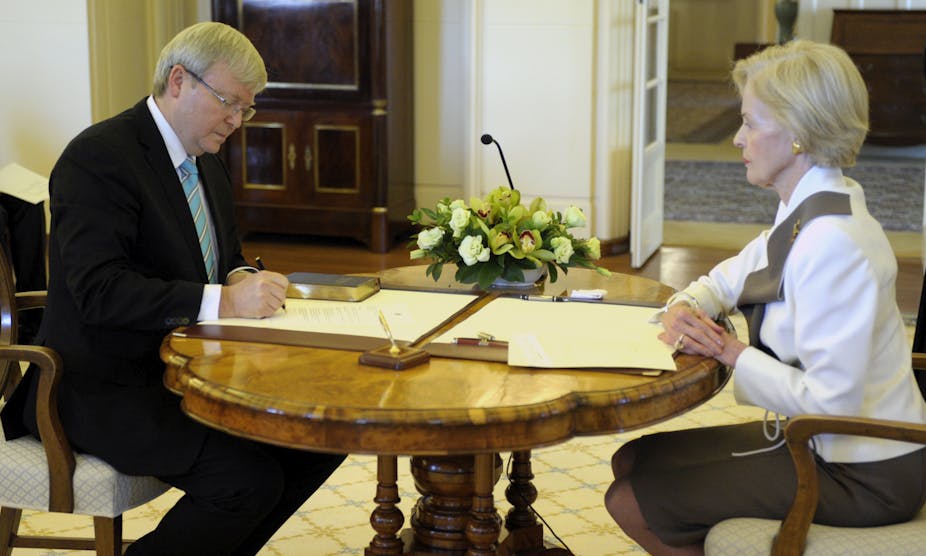The morning Julia Gillard was deposed as Australia’s prime minister many of the British newspapers carried a picture of her knitting a present for the future heir to the British (and presumably) Australian throne.
There was something very sad in this image. How had Gillard, once attacked for living in a house with an empty fruit bowl, come to this?
Watching a coup via distant internet is bizarre. The ABC news site carried a series of mindless tweets, presumably because the blogosphere can tolerate anything but silence. My Facebook messages breathed indignation, with most of my friends convinced Gillard was the victim of misogynist bullying.
I would be more convinced of this had Gillard herself not come to power by a similar, if less anticipated, coup. It is hard to accept the thesis that her fall was due to the machinations of nasty male machine politicians when she was made prime minister by similar means. She has also endorsed one of the less impressive party apparatchiks for the seat of Batman despite Labor’s commitment to finding more safe seats for women.
It is certainly true, as Anne Summers has elegantly demonstrated, that Gillard was constantly assailed by a viciousness that was clearly infused by deep-seated - indeed, pathological - sexism. It is also true that the concerted campaign of the Murdoch press and some of our shock jocks to deny her legitimacy has few parallels in recent history: although Whitlam faced a similar campaign of vituperation.
But when you remember that Gillard was elected leader because a majority of the Labor caucus believed she had a better chance of winning in 2010 than Rudd did, it is difficult to blame those caucus members who applied a similar logic three years later in deposing her. Remember, too, that she and Rudd combined their support to overthrow Kim Beazley as Labor leader. It was also her performance as deputy prime minister that convinced her colleagues she was a better bet than Rudd.
The real cause for regret is that just as she found it difficult to give a convincing explanation of how her policies would differ from Rudd’s, his return is equally without any commitment to a significant shift in vision for Australia. Should he bring forward the election date to August he can only run on the record of the current government, while simultaneously explaining why its leader needed to be replaced. This is the same dilemma Gillard faced last time.
The polls that caucus read three years ago let them down, leading to a hung parliament (which Gillard managed with remarkable political skill). My hunch is that caucus has similarly misread current polls. Many people will have a vague sense of satisfaction that what was portrayed as a stab in the back has now been avenged, but will still vote to change the government.
In the end Rudd may save a few seats in Queensland and NSW, but he cannot save the government. The most interesting question about Rudd is whether he will stay on as Leader of the Opposition, and indeed whether his remaining colleagues would want him. One wonders what deals may have been done to win over Bill Shorten, whose role as Labor kingmaker has now been further cemented.
One larger political question revolves around whether Rudd can lift the Labor vote sufficiently to deny Abbott control of the Senate. Whether a post-election ALP will have the emotional and intellectual resources to re-imagine themselves as a convincing party of government is also up for debate.
Unfortunately Gillard and Rudd shared an unwillingness to maintain a convincing progressive position when put under pressure. Rudd gave way on climate change after declaring it the “greatest moral challenge of our time”, and Gillard has steadily shifted her stance on asylum seekers without at any time showing genuine empathy for people willing to risk their lives to seek refuge.
Rudd’s belated support for same-sex marriage reeks of the same opportunism as Gillard’s opposition to it does. In contemporary Australia no Labor leader can survive by sounding as if they belong to the Greens, who have been consistent on all of these issues. But one wonders what a leader with the reckless courage of a Gough Whitlam would identify with the ALP’s politics in 2013.
The final undoing of Gillard was not, I believe, due to misogyny, but rather to her inability to articulate a clear vision of where she wanted to lead Australia. Her tragedy was that many of the pieces were there in the actual policies she pursued, but she never found a narrative that weaved them together.
Gillard has much of which to be proud, but she never communicated the personal warmth and commitment that one sees in her face-to-face. Yes, this is a greater challenge for a woman, particularly perhaps for a woman on the political left who faces the implacable belief of conservatives that they have the right to govern.
Rudd now inherits the great dilemma of all current “left” leaders. Despite the global financial crisis it is the parties of the right who seem to have most profited from the downturn brought on by the excesses of capitalism. When he penned long articles for The Monthly, Rudd seemed prepared to grapple with this question, even perhaps to move away from the faith in market solutions which is the legacy of the Hawke/Keating years. That he reached out to business in his initial speech suggests he is not inclined to pursue the logic of his own analysis.
Gillard did not fall because she was a woman, but undoubtedly she encountered increased hostility because of her gender. One is reminded of the comment about actress Ginger Rogers, namely that she did everything Fred Astaire did, but backwards and in high heels.

